Martyn BoutelleProfessor of Biomedical Sensors Engineering, Imperial College London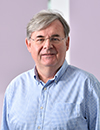 Martyn Boutelle is Professor of Biomedical Sensors Engineering in the Department of Bioengineering, Imperial College London, and Associate Provost for Estates Planning for Imperial College. |
John BrennanProfessor and Director, Biointerfaces Institute, McMaster University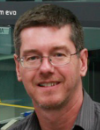 Professor John Brennan holds the Canada Research Chair in Bioanalytical Chemistry and Biointerfaces (Tier 1) and is Director of the Biointerfaces Institute at McMaster University. He is an expert in the development of biosensors and point-of-care diagnostics, with specific expertise in bioactive paper, high-throughput development of printable biomaterials, and development of solid-phase assays for diagnostics and small molecule screening. Dr. Brennan has published over 200 peer-reviewed papers, given over 150 invited presentations, and has been awarded several patents in the areas of POC diagnostics. |
Paul GoodwinScience Director, GE Healthcare Paul Goodwin is the Science Director for GE Healthcare, Life Sciences and resides in |
Karen KempsellSenior Project Team Leader, Public Health England Dr Karen Kempsell is an established senior scientist in the areas of microbial genetics & pathogenesis, immunopathology and diagnostics. She has an established track record in academic and industrial R&D and twenty three years of experience in the translational research and development area. She is currently the principle investigator/scientific lead of the diagnostics section of the Technology Development group at Public Health England Porton. She has extensive experience in microbiology, clinical infectious diseases, immunopathology, molecular and systems biology, bioinformatics, molecular and serological assay development and commercial diagnostic assay development and validation. She is invited speaker at scientific conferences on development of biomarker-based diagnostics. She manages external collaborations and relationships with key customers and stakeholders. She was the principle investigator on biomarker development programmes which led to patents for diagnostic biomarkers for human tuberculosis and sepsis. |
Christopher LoweProfessor, University of Cambridge, Director, Cambridge Academy of Therapeutic Sciences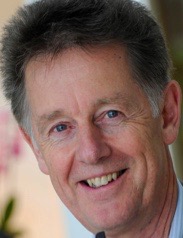 Professor Christopher R. Lowe was founder Director of the Institute of Biotechnology at the University of Cambridge and conducts research in both diagnostics and therapeutics in the healthcare biotechnology sector. He is a fellow of the Royal Academy of Engineering, the Institute of Physics and the Royal Society of Chemistry. He has 395 peer-reviewed publications, 8 books and monographs, >100 patents and has supervised >95 PhD students and has a number of national and international prizes: “Queen’s Award for Technological Achievement”; “Queen’s Anniversary Prize for Higher and Further Education”; “Most Entrepreneurial Scientist of the UK”; OBE in the Queen’s New Year Honours; BBSRC Commercial Innovator of the Year in 2011. He has been the driving force for the establishment of 11 spin-out companies including ProMetic Biosciences Inc (Market Cap $1.9-2.1B), Cambridge Sensors Ltd, Paramata Ltd, Psynova Neurotech Ltd and Royale Therapeutics Ltd., has a number of directorships and fosters entrepreneurship within the University via a Master’s in Bioscience Enterprise, the University’s Seed Fund Committee and other Business School and student-led activities. He is active in various government committees and in a number of legal and entrepreneurial roles. His group's primary research interest is in healthcare biotechnology, particularly where it is applied to the biopharmaceutical, sensors and diagnostics and enzyme and microbial technology sectors. The work is highly multidisciplinary and not only covers aspects of molecular biology, biochemistry, microbiology, chemistry, physics, electronics and engineering, but also the entire range from fundamental science to strategic and applied science. He is currently Director of the newly established Cambridge Academy of Therapeutic Sciences (CATS) within the University of Cambridge. |
Aydogan OzcanChancellor's Professor, University of California-Los Angeles; Associate Director, California NanoSystems Institute (CNSI)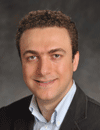 Dr. Aydogan Ozcan received his Ph.D. degree at Stanford University Electrical Engineering Department. After a short post-doctoral fellowship at Stanford University, he was appointed as a research faculty at Harvard Medical School, Wellman Center for Photomedicine in 2006. Dr. Ozcan joined UCLA in 2007 and he is currently the Chancellor’s Professor at UCLA and an HHMI Professor with the Howard Hughes Medical Institute, leading the Bio- and Nano-Photonics Laboratory at UCLA Electrical Engineering and Bioengineering Departments, and is also the Associate Director of the California NanoSystems Institute (CNSI) at UCLA. Dr. Ozcan holds 36 issued patents and more than 20 pending patent applications for his inventions in telemedicine, mobile health, nanoscopy, wide-field imaging, lensless imaging, nonlinear optics, fiber optics, and optical coherence tomography. Dr. Ozcan gave more than 40 plenary/keynote talks and 300+ invited talks and is also the author of one book, the co-author of more than 500 peer reviewed publications in major scientific journals and conferences. In addition, Dr. Ozcan is the founder and a member of the Board of Directors of Holomic/Cellmic LLC, which was named a Technology Pioneer by The World Economic Forum in 2015. Dr. Ozcan is also the Founder of Lucendi Inc. Prof. Ozcan received several major awards including the 2011 Presidential Early Career Award for Scientists and Engineers (PECASE), which is the highest honor bestowed by the United States government on science and engineering professionals in the early stages of their independent research careers. Dr. Ozcan received this prestigious award for developing innovative optical technologies and signal processing approaches that have the potential to make a significant impact in biological science and medicine; addressing public health needs in less developed countries; and service to the optical science community including mentoring and support for underserved minority undergraduate and graduate students. Dr. Ozcan also received the 2015 UCLA Postdoctoral Scholars Mentoring Award for his commitment to training and mentoring of postdoctoral researchers. In addition, Dr. Ozcan received the inaugural Rahmi M. Koc Science Medal, the International Commission for Optics (ICO) Prize, the inaugural SPIE BioPhotonics Technology Innovator Award, the Army Research Office (ARO) Young Investigator Award, SPIE Early Career Achievement Award, NSF CAREER Award, NIH Director’s New Innovator Award, the Office of Naval Research (ONR) Young Investigator Award, the IEEE Photonics Society Young Investigator Award and the MIT’s Technology Review TR35 Award for his seminal contributions to near-field and on-chip imaging, and telemedicine based diagnostics. Prof. Ozcan is also the recipient of the 2016 IEEE Photonics Society Distinguished Lecturer Award, 2013 and 2015 Microscopy Today Innovation Awards, 2012 Popular Science Brilliant 10 Award, 2012 National Academy of Engineering (NAE) The Grainger Foundation Frontiers of Engineering Award, 2011 Innovators Challenge Award presented by the Rockefeller Foundation and mHealth Alliance, the 2010 National Geographic Emerging Explorer Award, the 2010 Bill & Melinda Gates Foundation Grand Challenges Award, the 2010 Popular Mechanics Breakthrough Award, the 2010 Netexplorateur Award given by the Netexplorateur Observatory & Forum in France, the 2010 PopTech Science and Public Leaders Fellowship, the 2009 and 2016 Wireless Innovation Award organized by the Vodafone Americas Foundation as well as the 2008 Okawa Foundation Award, given by the Okawa Foundation in Japan. Prof. Ozcan was selected as one of the top 10 innovators by the U.S. Department of State, USAID, NASA, and NIKE as part of the LAUNCH: Health Forum organized in 2010. He also received the 2012 World Technology Award on Health and Medicine, which is presented by the World Technology Network in association with TIME, CNN, AAAS, Science, Technology Review, Fortune, Kurzweil and |
Joseph WangDistinguished Professor, SAIC Endowed Chair, University of California-San Diego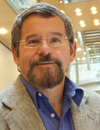 Joseph Wang is Distinguished Professor, SAIC Endowed Chair, and former Chair of the Department of Nanoengineering at University of California, San Diego (UCSD). He is also the Director of the UCSD Center of Wearable Sensors and Co-Director of the UCSD Center of Mobile Health Systems and Applications (CMSA). He served as the director of Center for Bioelectronics and Biosensors of Arizona State University (ASU) before joining UCSD. Prof. Wang has published more than 1175 papers, 11 books and he holds 30 patents (H Index=179, >135,000 citations). He received 2 American Chemical Society National Awards in 1999 (Instrumentation) and 2006 (Electrochemistry), ECS Sensor Achievement Award (2018), IUPAC Analytical Medal (2021) and 5 Honorary Professors from Spain, Argentina, Czech Republic, Romania, China and Slovenia. Prof. Wang has been the Founding Editor of Electroanalysis (Wiley), is RSC, ECS and AIMBE Fellow and a Thomson Reuters Highly Cited Researcher. His scientific interests are concentrated in the areas of bioelectronics, wearable devices, biosensors, bionanotechnology, nanomachines and microrobots, flexible materials, and electroanalytical chemistry. |
Guang-Zhong YangDirector and Co-Founder of the Hamlyn Centre for Robotic Surgery; Professor, Imperial College London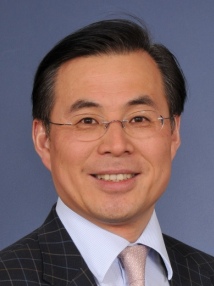 Professor Guang-Zhong Yang is director and co-founder of the Hamlyn Centre for Robotic Surgery. The Hamlyn Centre (http://www.imperial.ac.uk/hamlyn-centre/) has been established for developing safe, effective and accessible imaging, sensing and robotics technologies that can reshape the future of healthcare for both developing and developed countries. Focusing on technological innovation but with a strong emphasis on clinical translation and direct patient benefit with a global impact, the centre is at the forefront of research in imaging, sensing and robotics for addressing global health challenges associated with demographic, environment, social and economic changes. |




